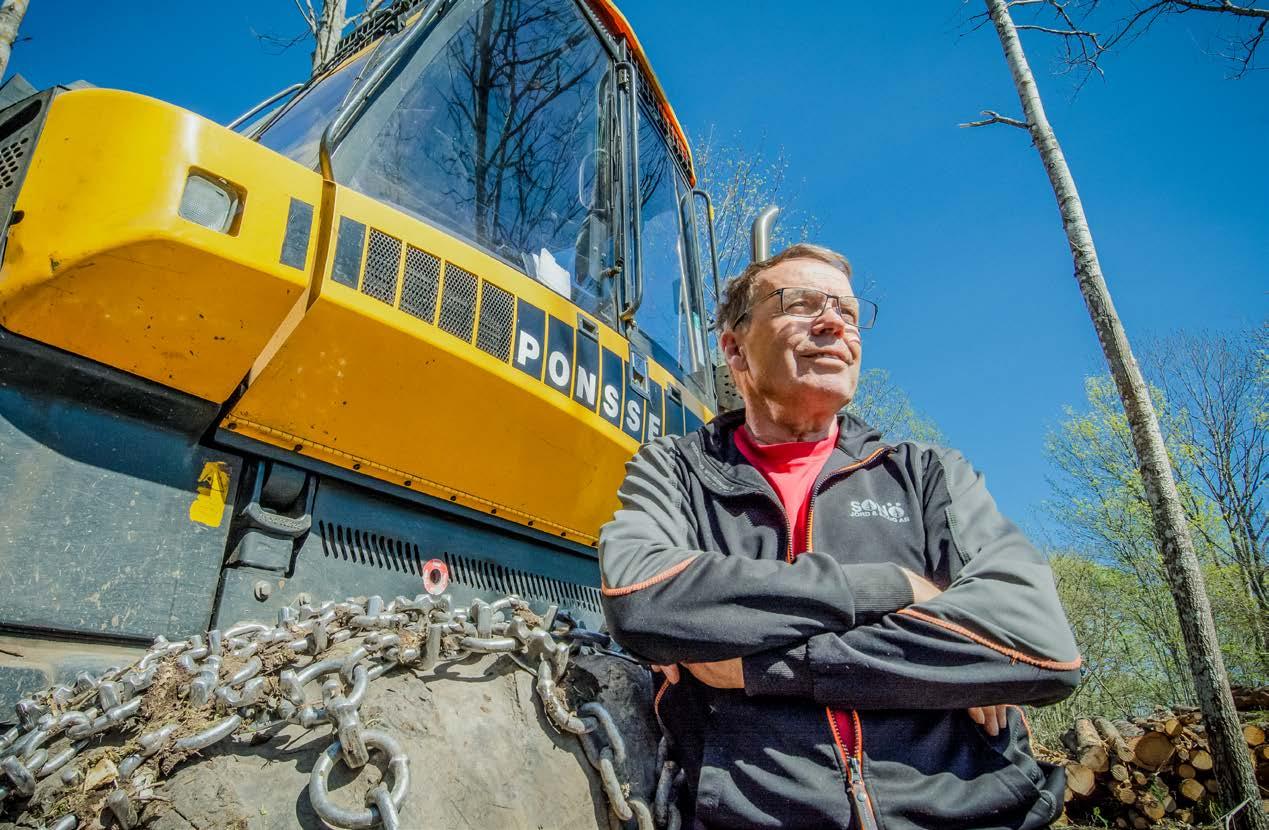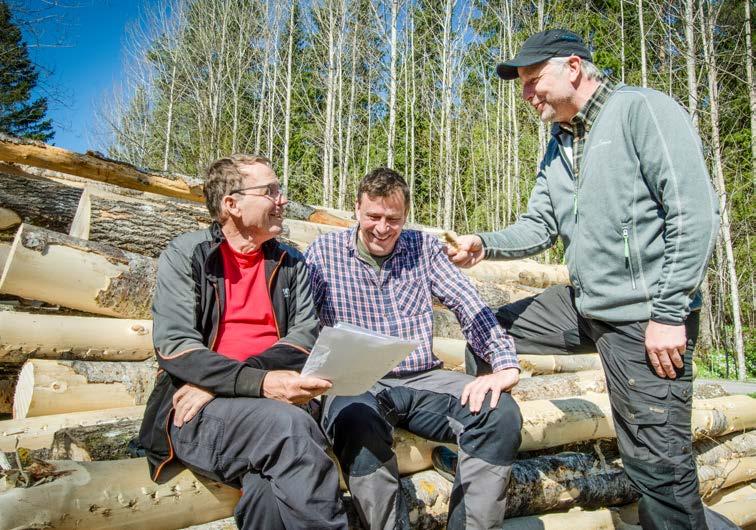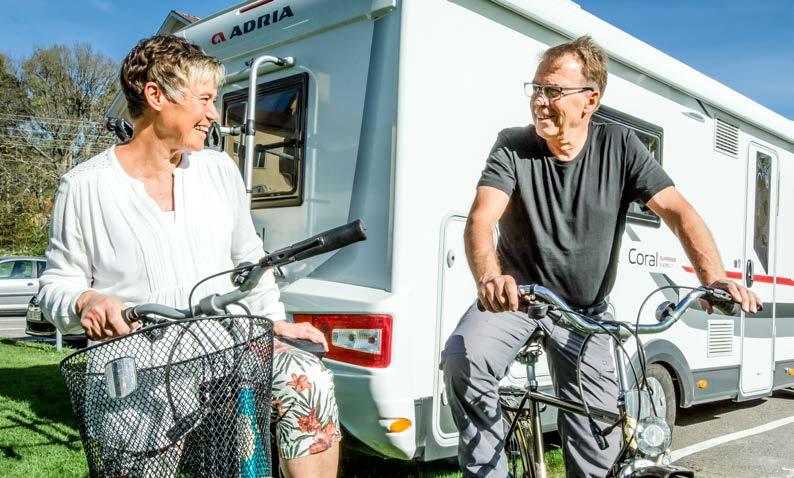
12 minute read
“As a Dual operator I make all the decisions” BO NOAKSSON CHOSE A WINNING COMBINATION
by Ponsse Plc
Bo Noaksson has over 55 years of experience working in forests, yet he still enjoys his work. He likes both harvesting and transportation and is more than happy with the Dual concept as it allows him to do both jobs with the same machine. “Forests and people have a lot in common: you have to bring out the best qualities in each one,” says Bo who has also worked with young people as an athletics coach.
It is a beautiful May day in the coastal area of Roslagen in Sweden. The entre preneur's working environment seems almost idyllic in the middle of the bird song and little white flowers known as wood anemones. The owner of two
PONSSE BuffaloDuals, forest machine entrepreneur Bo Noaksson climbs down from his machine and sits down next to a stack of aspen.
“There is a bit of everything here – co nifers and deciduous trees, logs and pulpwood. There is also some old pastureland which needs work, so there is a lot of thinning to do. This is a versatile work site and it feels great to see the results of my work,” Bo says and smiles.
“We were already familiar with the BuffaloDual and realised that a ten-wheel model would be the perfect solution for sites with very soft soil,” Bo says.
Sites like these have become the trademark of Sonö Jord & Skog AB, the forestry company owned by Bo and his grandson Fredrik Gustafs son. The two men appreciate these varied jobs that often involve both forest and landscape management tasks. This view is shared by Sonny Pettersson who started working for the company in 2007 and was also a partner in the company for nine years.
THE VERSATILE DUAL CONCEPT It is characteristic of Sonö Jord & Skog that work is done using a BuffaloDual which is both a harvester and a forwarder. Bo bought the first machine in 2003. Back then it was the third Dual machine imported into Sweden.
“During the past four years we have only used BuffaloDuals,” Bo says.
One of them was bought in 2013 and it's the world's first and so far the only ten-wheel BuffaloDual.
“Hargs Bruk, one of our customers, asked us to find a suitable solution for sites with very soft soil. First we thought about buying a machine that is designed for soft soil areas, but we were not sure about its performance. We were already familiar with the BuffaloDual and real ised that a ten-wheel model would be a perfect solution for the problem,” Bo says.
“Ponsse took the idea and designed a tai lored model for us.”
“It's not a coincidence that we have two Duals. The main benefits are their flexibility and productivity and the fact that there is always work to do,” Bo Noaksson says.

The retrofitted 10w solution, where a third pair of wheels is attached to the back of the rear bogie, is normally available with a fixed additional axle for PONSSE Wisent forwarders and with a hydraulic additional axle for the Elk and Buffalo machines.
“The ten-wheel configuration has been a major asset for us. Next September we will get a new BuffaloDual and it will also be a ten-wheeler.”
STRAIGHT FROM THE FINNMETKO EXHIBITION The new BuffaloDual will be delivered to Sweden directly from the FinnMETKO exhibition where it will be shown to the public for the first time at the end of August.
“Of course we will also visit the event. Now we have even more reason to be there,” says Bo who is anxiously waiting for the new Dual machine.
“Our new Dual will also have a new generation cabin solution. The crane and hydraulics will also be upgraded. I can't wait to see the machine and use it.”
PONSSE MACHINES SINCE 1995 The new Dual will be the thirteenth PONSSE machine in the company's history . The black and yellow tradition began in 1995 when the company bought an S15 forwarder.
“It all began when one of our em ployees showed me pictures of PONSSE forwarders. They looked exactly like agile and high-performance forwarders should. I also heard that Nyströms Mekaniska in Edsbro offers services for the machines. It is a professional workshop in the middle of our company's operating area, so I became even more interested. A few years later we bought a PONSSE Cobra harvester.”
“The eight-wheel Cobra was a fantastic machine that could almost travel on water.”
Over the years, the company has also owned Ergo and Beaver harvesters as well as Bison and Caribou forwarders.
Bo believes that Ponsse has represent ed its colours well.
“The machines are reliable and we have always received understanding and enthusiastic service from both the sales and service departments. It is very impor tant to us.”
Sonö Jord & Skog has kept its fleet new. Most of the machines have been bought new and replaced after about 11,000-12,000 operating hours.
“New machines are nice to work with, which is important to us and our em ployees. We have also been able to reduce downtime. And, of course, it's always fun to try new technology.”
A NEW BOOST FOR BUSINESS At the beginning of the 2000s, Bo owned two machines and the company had 4 or 5 employees. As the financial situation within the industry deteriorated even further, Bo got fed up with working as a forest machine entrepreneur.
“Savings had to be made in everything. It was not a very encouraging atmosphere.”
Nevertheless, Bo decided to continue and after finding the new BuffaloDual his business got a new boost.
“I had never seen a BuffaloDual in action, but I had a feeling that it's a really good machine. So I bought it without seeing it, which is what I also did with
the S15 eight years earlier. The Dual was really pleasant to operate. Suddenly I was able to do harvesting, loading and cutting without other equipment.”
“Others should also open their eyes to the benefits of the Dual concept. The features are in a class of their own and downtime is minimal. Switching from one machine to another takes only ten minutes or less. With just one switch we can utilise double or actually triple func tions. In addition to the varied jobs, the biggest benefit is the fact that now there is always work to do. Thanks to the Duals we are able to plan our work days in the best possible way. Our work days are full and therefore also productive.”
“Switching between tasks is also bene ficial for the machine. The powerful crane is also a major asset in loading use.”
PRODUCTIVE WORK DAYS Bo has clearly noticed that the high utilisation rate of the Dual machines and efficient work days also show in the pos itive profitability figures. It is therefore fair to ask why Dual machines are not used more.
“I believe that this is largely to do with the fact that harvesters and forwarders are clearly divided into separate product groups. However, I think many oper ators would appreciate it if harvesting

and loading could be done with a single machine.”
“I wouldn't want to choose one or the other. Switching between tasks gives va riety and a boost to my work days. It feels so natural with the Dual.”
IMPORTANT DIALOGUE According to Bo, an ideal job is one where first thinning is combined with pastureland work and roadside clearing. These types of jobs also increase dialogue with the customer and landowner, which is something that Bo and his colleagues value.
“If the weather is too rainy and the soil is too soft for driving in the forest, we just switch to a cutting head.”
Customers are billed almost always on an hourly basis.
“When there are many special tasks, this form of billing makes the most sense and our customers also feel the same.”
It is obvious that Bo enjoys his work and has a lot of professional pride.
“It is nice to see the fruit of my labour while doing something good,” says Bo who likes to return to his work sites even after his work is done.
Bo says that the advantage of the Dual concept is the fact that he can always make the decisions regarding his work – totally independently.
“In the wintertime, all timber needs to be transported by Friday evening of each week to make sure that snow doesn't cover it or block routes during the weekend. Only after it has been transported can I rest without worries.”
FOLLOWING IN HIS FATHER'S FOOTSTEPS Bo spent his childhood in the countryside. His father was a logger and immediately after 7th grade Bo also started working for the local forest owners' association.
“It was easy to get work and I paid my first taxes at the age of 15,” Bo says.
Bo also tried carpentry but quickly re turned to forestry work.
“I missed the smell of spruce and pine. There is something about working in a forest.”
In 1970, Bo started doing forest machine work for the local forest owners' association. The machine picked up the felled trees and then delimbed, cut and stacked them.
“We did not have measuring wheels back then and timber was measured using dec imetres, so the measurements were not as accurate as they are today. Cutting was done without computers. Although, even now you have to use your head too in spite of the computers. They are, after all, only an aid.”
After spending four years in a forest ma chine cabin, Bo started to work as a logger again in addition to his job as a farmer. In the 1980s, the company invested in a two-grip harvester that was later converted into a single-grip harvester.
“At first I was sceptical about the sin gle-grip technology, but soon they were the only machines we had.”
At first Bo ran his business as a sole trader, but in 1990 the business became a limited company. His big brother, Ove Noaksson, handled timber transportation for several years.
ATHLETICS COACHING The local forests have benefited a great deal from the fact that Bo Noaksson chose to work in the forest industry. At the same time, the local athletes have also benefited
Bo Noaksson values dialogue with customers and timber buyers. In the picture, Bo Noaksson with Brogarn Förvaltning's representative Magnus Berkefelt and timber buyer Henrik Larsson from BillerudKorsnäs.
SONÖ JORD & SKOG AB
Owners: Bo Noaksson and his grandson Fredrik Gustafsson
Operations: Thinning, pastureland work
Geographical operating area: Mainly the Uppland area
Number of employees: Three, including the owners
Machinery: Two PONSSE BuffaloDuals with H53 harvester heads. PONSSE EH25 energy wood harvester head. One of the Duals is a 10-wheel machine.

Monika and Bo Noaksson love the freedom offered by their camper van.
from the fact that he has had time for other activities besides work. As a youth athletics coach, Bo has supported many young talents, mainly middle-distance runners. Bo worked as a coach from 1978 until 2013. The athletes usually trained three times a week and everything was done on a voluntary basis.
“Those 35 years were good years with a lot of joy and wonderful experiences. The kids competed at different levels and won about twenty national championships.”
Bo was also an athlete as a young man and competed at local level. His favourite events were the 100-metre sprint and 80-metre hurdles.
“I didn't want to torture myself for too long, so I stuck to the short distances.”
ENOUGH TIME TO DEVELOP What business and athletics have in common is that, according to Bo, it takes time to develop.
“Results are important, but you have to find the right ways to get there, be determined and give yourself enough time to develop. Otherwise difficulties can be expected.”
“For an entrepreneur this means that you have to take care of your finances, do your work well and find good customers who are willing and able to pay decent compensation. If your business is not profitable, you should make the required decisions immediately and not wear your self out with the wrong customers and see your debt grow. My aim has always been to develop my business without running into debt.”
TRAVELLING IN A CAMPER VAN Although coaching young athletes was very rewarding, these days Bo prefers spending time with his family. Together with his wife Monika, they often pack their camper van and head to natural and cul tural destinations, both near and far away. The camper van is also convenient when they visit their children and grandchildren.
“We used to have a boat, but we sold it a year ago and bought the camper van. Boating is great, but the camper van offers a different kind of freedom.”
Bo and Monika have found many won derful sites in different parts of Sweden. Their favourite locations are the Jämtland fell area as well as Älvkarleby which is closer to their home.
“This summer we are going to visit the Österlen area in Skåne. We've been mean ing to go there for a long time and now it's time to carry out the plan.”
Monika used to work as a hairdresser and masseuse. The active retiree loves spending time outdoors and going for walks with her friends. Her circle of friends also includes immigrants and she likes to help them deal with the authorities and learn Swedish.
“It's wonderful to be able to help oth ers,” says Monika who is also involved in a local housing cooperative.
FREE TIME IS FOR RELAXATION Bo knows how to put work matters aside and rest during weekends and Monika confirms this.
“It's true. He doesn't talk about work in his free time,” Monika says.
Bo also thinks that there are many oth er topics that are more fun to discuss with friends and family.
“I think my work as a youth coach taught me to push work things aside when Friday night comes. If work things come up during the weekend, I try to postpone them until Monday as much as possible,” Bo says. He loves his work but also under stands the importance of free time.
“I retired years ago, but I still work every now and then because I like working and I can support Fredrik during the early stages of his entrepreneurship.”

